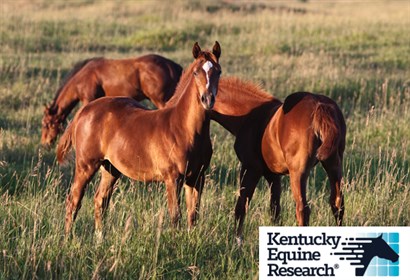
Winter Feeding
By Kentucky Equine Research Staff

Although Australian winters are generally mild compared to the northern hemisphere, temperatures can still drop considerably and for many Australian regions the cold winter blues are just around the corner. With the cold weather upon us, it’s time to start thinking about how your horses’ daily nutritional requirements will change in the winter time, and how you can be sure that he or she stays in tip-top condition right through until spring.
The cold weather of winter puts extra demands on the horse’s metabolism. More energy is required for day to day activities in the cold compared to the same activities performed in a milder climate. Therefore in winter many horses and ponies need extra feed for maintenance, conditioning and work. As well as expending energy simply keeping warm when it’s cold, horses use more energy working when it is wet and muddy because of the extra effort involved in pulling the feet out of the mud, and the reduced ability to maintain body heat with a wet coat.
Some horses, particularly ponies, do just fine in winter and need no real change in management. Other types, such as Thoroughbreds, may be poor doers and require extra calories to maintain condition over the colder months. If you do need to change your management to avoid winter weight loss you need to start before the weight has really fallen off. Starting to monitor your horses’ weight at the end of summer will help you to notice quickly if he starts to lose condition. If you have access to weigh scales or a weigh tape, use them once per week and record your measurements to monitor changes. Alternatively learning how to condition score your horse will make you more aware of his ideal weight, and checking and recording his condition score on a weekly or fortnightly basis will ensure that you to notice even small changes before they start to become a problem.
Forage should be the basis of all horse’s diets and each horse should consume at least 1.5% of their body weight in pasture and/or hay daily. If pastures are low then supplementary hay will be required and the type of hay selected is very important. Clover or lucerne blends are often the best choice but can be hard to find. Legume hay contains more energy than grass hay, although well-made grass/clover or grass/lucerne mixes can be terrific for horses in the winter time. Look for plenty of leaf, and soft wispy stems, as this shows that the hay was harvested at the time when nutrient composition was at its peak and is better quality than crops that have been left to go to flower or seed and consequently have reduced nutrient quality. You can get the same effect feeding chaff, but it’s more expensive and you need to feed a 20 litre bucket to supply the same amount as a good biscuit of hay. Hay is a far more natural feed for horses than grain and less likely to cause digestive upset if it is used as the first choice supplement in winter.
Some horses, i.e. working horses or particularly poor doers, are unable to maintain condition on forage alone and need the increased energy density of grain. If you want the convenience and peace of mind of knowing that your horse is getting all the essential nutrients they require in each scoop, it may be best to look at the complete feeds available on the market. Have a good look at the label and pick a feed that is fully balanced and has enough supplementary minerals and vitamins, so that you don’t have to add an extra supplement.
High fat feeds can also be a real advantage in the cold weather for preventing weight loss. Fat contains two and a half to three times the energy of grain and is therefore a great way of increasing calories in the diet without feeding large amounts. Good fat sources are vegetable oils, sunflower seeds (25-30% fat) and rice pollard (15-20% fat). KER Equi-Jewel® is a high fat low starch energy supplement that is one of the most effective and safest ways at achieving weight gain. Equi-Jewel is a stabilised rice bran product that contains 18% fat from rice oil and is an excellent supplement for winter to increase the energy density of the diet.
In summary, watch your horses’ body condition carefully and make dietary changes at the first sign of bad weather or weight loss. Remember that your horse doesn’t need to be in “show condition” all winter but most horses will need extra care to come out of the winter in top shape. For more information on feeding horses over the colder months, or for a custom made diet designed specifically for your horse, contact Kentucky Equine Research on 1800 772 198, or email advice@ker.com.
https://www.equestrianlife.com.au/articles/Winter-Feeding_